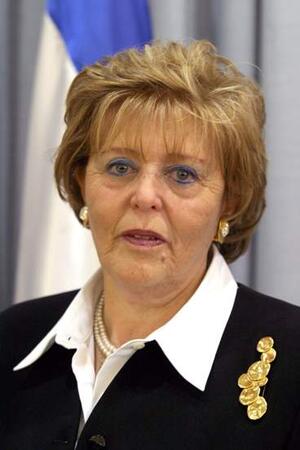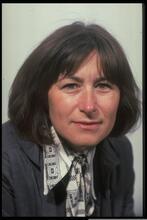Edna Arbel
Israeli Supreme Court Judge Edna Arbel, date unknown.
Photo from the Judiciary of Israel. Wikimedia Commons
A justice on Israel’s Supreme Court from 2004 to 2014, Edna Arbel was born in Jerusalem in 1944. After her military service, she studied law at Hebrew University and later completed a Master’s degree at Bar Ilan University. She was admitted to the bar in 1969 and in 1972 began working in the State Attorney’s office. She dealt with a variety of cases involving serious crimes such as murder, security offenses, violence, drugs, and white-collar offenses. In 1984 she was appointed District Attorney and in 1988 she became a judge. In 1996 Arbel became state prosecutor, where her courageous determination to combat both governmental corruption and rising violence not only placed her in the public limelight but at times also aroused considerable hostility.
A justice on Israel’s Supreme Court from 2004 to 2014, Edna Arbel was born in Jerusalem on June 22, 1944. Her Czech-born father, Yizhak Englander (1915–2002), immigrated to Palestine from Poland in 1933, studied law and Arabic studies at the Hebrew University of Jerusalem, and practiced law in Jerusalem. In 1943 he married Tova Estreicher (1917–1989), who was born in Budapest, arrived in Palestine at the age of two, studied administration, and became a civil servant in the Ministry of Justice. Their second daughter, Judith, was born in 1951.
Education and Early Career
In the course of her military service, which began in 1962, Arbel studied law at the Tel Aviv extension of the Hebrew University and later (1975) went on to complete a master’s degree at Bar Ilan University in 1979. After clerking for a private law firm, she was admitted to the Israel Bar in 1969. In 1972 she began working as an attorney at the Central District office of the State Attorney, where she dealt with a variety of cases involving serious crimes such as murder, security offenses, violence, drugs, and white-collar offenses. During this period she also served as a representative of the Ministry of Justice on the District Planning and Building Committee and was a member of the Psychiatric Committee, which deals with the release from hospitalization of mentally ill individuals who have committed criminal offenses. At the request of the Attorney General and the Ministry of Justice, Arbel served on a number of ad-hoc committees. These included the Committee on Undercover Agents and the committee that investigated the events following the 1984 terrorist hijacking of an inter-urban bus (Bus 300), which involved the capture of the terrorists, their killing by Israeli security forces, and the attempt to obstruct the investigation. She was also on the staff of the committee of inquiry that investigated the events that occurred in 1982 in the refugee camps of Sabra and Shatila in Lebanon, where members of the South Lebanese Army, aided by the Israeli military, massacred hundreds of Palestinians.
Work as District Attorney and State Prosecutor
In 1984 Arbel was appointed District Attorney of the Central District. In 1988 she was appointed as a judge in the Tel Aviv District Court, where she served for five years on an appellate panel of three judges which heard both civil and criminal cases. In January 1996, she succeeded Dorit Beinisch as State Attorney. She served in this position for eight years under six successive ministers of justice and was involved in the legal aspects of a number of the country’s major politically related cases. Her courageous determination to combat both governmental corruption and rising violence not only placed her in the public limelight but at times also aroused considerable hostility.
As State Prosecutor, Arbel was subordinated to the Attorney General, with whom she coordinated the handling of various high-profile criminal cases. In sensitive or complex cases, the Attorney General and the State Prosecutor personally evaluated the evidence and decided whether it sufficed to serve as the grounds for an indictment. Examples of such decisions related to the proposed appointment of Roni Bar-On as Attorney General in 1997 and the investigations respectively of President Ezer Weizman and Prime Minister Benjamin Netanyahu. Where Arbel perceived flaws in the law, she called upon the government and the Lit. "assembly." The 120-member parliament of the State of Israel.Knesset to amend existing legislation. Examples include her demand for protection of state witnesses and her opposition to the use of “moderate physical pressure” on prisoners held by the state security services. She chaired a committee that formulated an ethical code for attorneys.
In 2004, Arbel was nominated to the Supreme Court by Chief Justice Aharon Barak; she in this position until 2014.
In addition to her judicial work, Arbel has lectured on criminal law at Tel Aviv University and attended international conferences, primarily such as deal with criminal law or the laws of evidence.
Since 1964 Arbel has been married to Uri Arbel (b. 1940), a career officer in the Israel Defense Forces, who retired with the rank of lieutenant-general. They have three daughters: Sagit (b. 1966), Zohar (b. 1971) and Keren (b. 1974).




